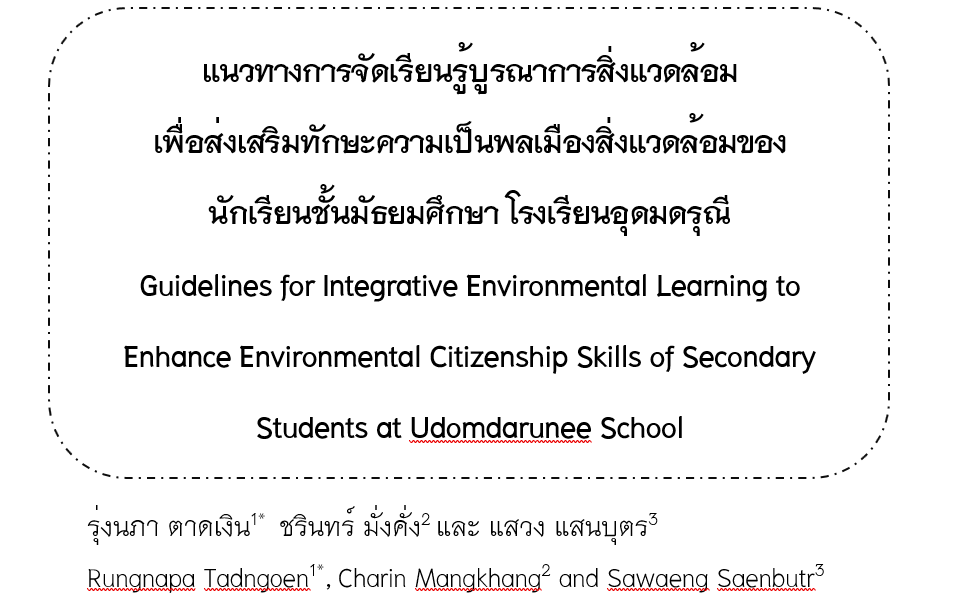Guidelines for Integrative Environmental Learning to Enhance Environmental Citizenship Skills of Secondary Stu-dents at Udomdarunee School
Keywords:
Integrated learning, Environmental Citizenship, Secondary School StudentsAbstract
The purposes of this study were to 1) study students’ perception of integrative environmental learning conditions 2) to study environmental citizenship skills of students; and
3) to study guidelines for integrative environmental learning of students of Udomdarunee School, Sukhothai province. The samples consisted of 50 students in Matayomsuksa II at Udomdarunee School, Sukhothai province. The research instrument is the questionnaire on integrative environmental learning. The data were analyzed by using percentage, frequency, mean, standard deviation, and content analysis.
The results of the study were as follows: 1) The student’ perception of integrative environmental learning conditions was at the moderate level. 2. Environmental citizenship skills of students was at a high level. And 3. The guidelines for integrative environmental learning arranged according to the the most opinions to the least as follows: 1. Using the truth data from the observation process to raise questions about environmental problems in the community in order to link to the subject matter of learning. 2) Building skills for searching, gathering knowledge, and solving environmental problems. 3) Creating a good attitude, public mind and ethics for environmental conservation. 4) Creating deep understanding about the environment and locality 5) The integration of knowledge of content that is redundant 6) Integrate environmental learning resources together between schools and communities 7) Teachers, students, and communities are involved in policy making and environmental activities. 8) Raising awareness about environmental problems. and 9) Impact and follow up news about environmental problems and provide useful opinions.
References
กรมส่งเสริมคุณภาพสิ่งแวดล้อม. (2559). คู่มือแนวทางดำเนินงานโรงเรียน Eco-schoo.สืบค้น 25 ตุลาคม 2561, จาก https://www.deqp.go.th/media/36332/eco-schooththai-guide.pdf.
ชรินทร์ มั่งคั่ง. (2561). การถ่ายทอดองค์ความรู้ศาสตร์พระราชาของครูศูนย์การเรียนรู้ชุมชนเพื่อส่งเสริมความเป็นพลเมืองวิถีเขียวของผู้เรียนในพื้นที่โครงการหลวงภาคเหนือของไทย. Veridian E-Journal Silpakorn University, 11(1), 1503-1521.
ฐากร สิทธิโชค. (2559). การจัดกระบวนการเรียนรู้สิ่งแวดล้อมศึกษาในสถานศึกษา. วารสารมนุษยศาสตร์สังคมศาสตร์ มหาวิทยาลัยทักษิณ, 11(ฉบับพิเศษ), 177-197.
นฤมล อภินิเวศ และคณะ. (2555). แนวทางสร้างสรรค์ โรงเรียนสิ่งแวดล้อมศึกษาเพื่อการพัฒนาที่ยั่งยืน (Eco-School). กรมส่งเสริมคุณภาพสิ่งแวดล้อม. กรุงเทพฯ: โรงพิมพ์สำนักงานพระพุทธศาสนาแห่งชาติ.
บุญชม ศรีสะอาด. (2532). วิธีการทางสถิตสำหรับการวิจัยเล่ม 1. กรุงเทพฯ: ภาควิชาพื้นฐาน ของการศึกษาคณะศึกษาศาสตร์ มหาวิทยาลัยศรีนครินทรวิโรฒ มหาสารคาม.
พิชญา ปิยจันทร์. (2560). สิ่งแวดล้อมศึกษา: กระบวนการเรียนรู้ผ่านการลงมือทำอย่างเท่าเทียม. วารสารสิ่งแวดล้อมศึกษา, 21(3), 38-42.
วินัย วีระวัฒนานนท์. (2546). สิ่งแวดล้อมศึกษา. กรุงเทพฯ: โอเดียนสโตร์.
สุทธิพงศ์ นิพัทธนานนท์. (2556). แนวทางในการพัฒนาโรงเรียนสิ่งแวดล้อมเพื่อการพัฒนาที่ยั่งยืน ตามกรอบของกรมส่งเสริมคุณภาพสิ่งแวดล้อม.
(ดุษฎีนิพนธ์ปรัชญาดุษฏีบัณฑิต). เชียงใหม่: มหาวิทยาลัยราชภัฏเชียงใหม่.
เสรี วรพงษ์. (2557). สิ่งแวดล้อมกับการพัฒนาที่ยั่งยืน. วารสารสังคมศาสตร์บูรณาการ, 1(1), 161-176.
Meaghan Guckian. (2017). Beyond Green Consumerism: Uncovering the Motiva-tions of Green Citizenship. Retrieved August 26, 2019, From https://quod.lib.umich.edu/m/mjs/12333712.0005.105?view=text;rgn=main.

Downloads
Published
How to Cite
Issue
Section
License
Copyright (c) 2021 Phayao University

This work is licensed under a Creative Commons Attribution-NonCommercial-NoDerivatives 4.0 International License.
ผู้นิพนธ์ต้องรับผิดชอบข้อความในบทนิพนธ์ของตน มหาวิทยาลัยพะเยาไม่จำเป็นต้องเห็นด้วยกับบทความที่ตีพิมพ์เสมอไป ผู้สนใจสามารถคัดลอก และนำไปใช้ได้ แต่จะต้องขออนุมัติเจ้าของ และได้รับการอนุมัติเป็นลายลักษณ์อักษรก่อน พร้อมกับมีการอ้างอิงและกล่าวคำขอบคุณให้ถูกต้องด้วย
The authors are themselves responsible for their contents. Signed articles may not always reflect the opinion of University of Phayao. The articles can be reproduced and reprinted, provided that permission is given by the authors and acknowledgement must be given.







